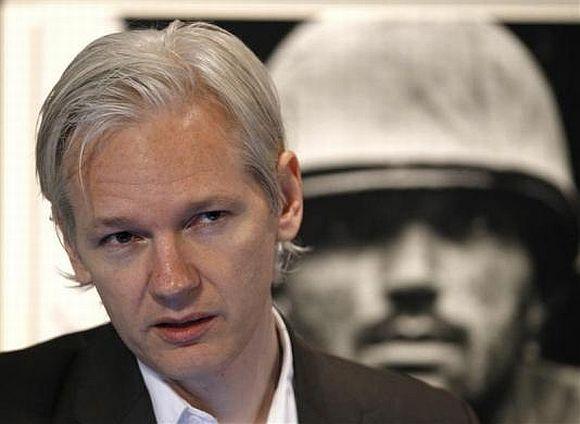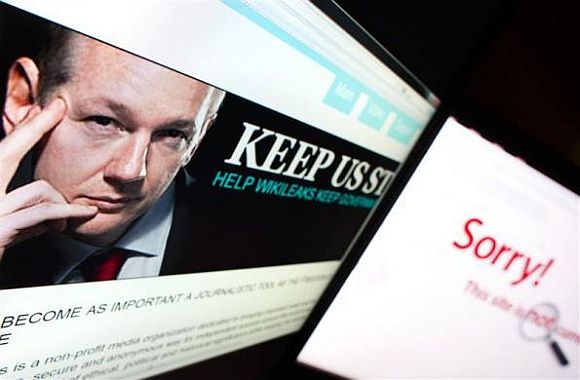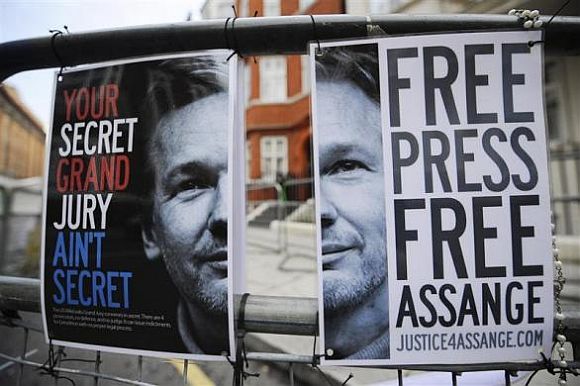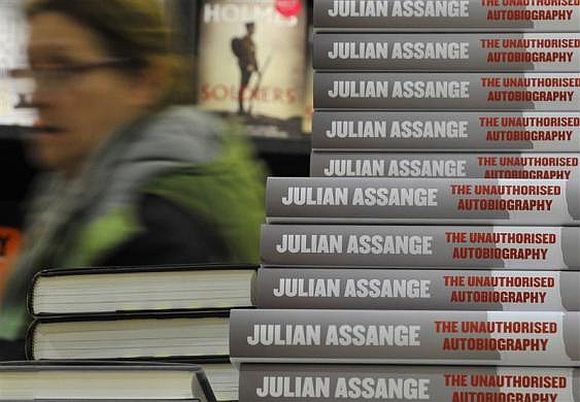
Ecuador on Thursday granted political asylum to WikiLeaks founder Julian Assange, setting stage for an unprecedented diplomatic stand-off with the UK, which has threatened to extradite him to Sweden come what may.
Two months after he dramatically sought refuge in its embassy here to evade extradition to Sweden to face sexual assault charges, Ecuador on Thursday said it had decided to take Assange under its wing over fears that he might eventually be sent to the US to face "military courts".
Ecuadoran Foreign Minister Ricardo Patino said at a news conference in the Ecuador capital that Sweden, Britain and the US had failed to provide guarantees that the 41-year-old Australian will not be extradited to the US from Sweden.
"The Ecuador government, loyal to its tradition to protect those who seek refuge with us at our diplomatic missions, has decided to grant diplomatic asylum to Mr Assange," he said.
...

Following Ecuador's decision, Assange -- in a statement -- said: "I am grateful to the Ecuadorian people and President Rafael Correa and his government. It was not Britain or my home country, Australia, that stood up to protect me from persecution, but a courageous, independent Latin American nation".
Assange termed the asylum as a "historic victory", but acknowledged that there were plenty of "struggles" ahead.
He demanded that the "unprecedented" US investigation against WikiLeaks be stopped.
"While today much of the focus will be on the decision of the Ecuadorian government, it is just as important that we remember Bradley Manning has been detained without trial for over 800 days".
Manning is accused of leaking secret US documents to WikiLeaks, which published it online.
...

Following the announcement, Britain said it was a "disappointing" decision but insisted London was under "obligation" to extradite the whistleblower to Sweden.
"We shall carry out that obligation. The Ecuadorian government's decision this afternoon does not change that," said a Foreign Office spokeswoman, making it clear that getting an asylum was not an end to Assange's woes.
Earlier, Britain said it had powers under the Diplomatic and Consular Premises Act, 1987, to withdraw the embassy's diplomatic status and then enter the building to arrest Assange and extradite him to Sweden.
Ecuador had said that Britian was threatening to "assault our embassy" if Assange was not handed over.
An unprecedented diplomatic row has arisen from Ecuador's decision as Assange remains on British police's radar whose personnel are positioned right outside the embassy to arrest him as soon as he steps out.
...

Assange, who has ruffled many feathers by publishing classified diplomatic correspondence of the United States and other countries, expressed his delight after an angry Patino announced the decision on his asylum application.
Assange said: "It is a significant victory for myself, and my people. Things will probably get more stressful now," as supporters debated the ways in which he could leave the embassy and fly to Ecuador without being arrested by the British police.
Experts said there were virtually no precedents to such a diplomatic impasse, but cited the case of a Hungarian priest who stayed in the US embassy in Budapest for nearly 15 years following the Hungarian uprising in 1956.
The Foreign Office said: "We are disappointed by Ecuador's foreign minister. We remain committed to a negotiated solution that allows us to carry out our obligations under the Extradition Act".
"Under our law, with Mr Assange having exhausted all options of appeal UK authorities are under binding obligation to extradite him to Sweden".
The Foreign Office said it was "still committed to reaching a mutually acceptable solution", and added that throughout it had drawn Ecuador's attention to relevant provisions of British law.
...

Earlier, a number of Assange's supporters gathered outside the embassy on Thursday morning and shouted slogans in support of Ecuador and Assange.
Three persons were arrested on Thursday morning in a scuffle between the police and Assange's supporters.
WikiLeaks condemned "in strongest possible terms the UK's resort to intimidation", and added: "Any transgression against the sanctity of the embassy is a unilateral and shameful act, and a violation of the Vienna Convention, which protects embassies worldwide".
Sweden, meanwhile, rejected Ecuador's claim that Assange would not have a fair trial as a reason for granting him political asylum.
"Our firm legal and constitutional system guarantees the rights of each and everyone. We firmly reject any accusations to the contrary," Foreign Minister Carl Bildt said on his Twitter account.
WikiLeaks, on its part, said the British threat was designed to pre-empt Ecuador's decision on whether it will grant political asylum to Assange, and "to bully Ecuador into a decision that is agreeable to the United Kingdom and its allies".
...

The statement said: "A threat of this nature is a hostile and extreme act, which is not proportionate to circumstances and an unprecedented assault on the rights of asylum seekers worldwide.
"We draw attention to the fact that the United Nations General Assembly has unanimously declared in Resolution 2312 (1967) that 'the grant of asylum is a peaceful and humanitarian act and that, as such, it cannot be regarded as unfriendly by any other State'."
The website noted that Assange had not been charged with any crime in any country.
The statement added: "We note with interest that this development coincides with the UK Secretary of State William Hague's assumption of executive responsibilities during the vacation of the Prime Minister and Deputy Prime Minister".
Assange had taken shelter in the Ecuadorian embassy in June defying a British police order to turn himself in for extradition to Sweden.
The whistleblower, who invited the wrath of the United States after publishing secret diplomatic cables, has maintained that the allegations of sexual offences against him were politically motivated.
The former computer hacker has expressed apprehension that he would eventually be extradited to the US, where he could be tried for espionage.
WikiLeaks published over 2,50,000 confidential US diplomatic cables in 2010 that included information on the wars in Iraq and Afghanistan.
Click here to go further...
...